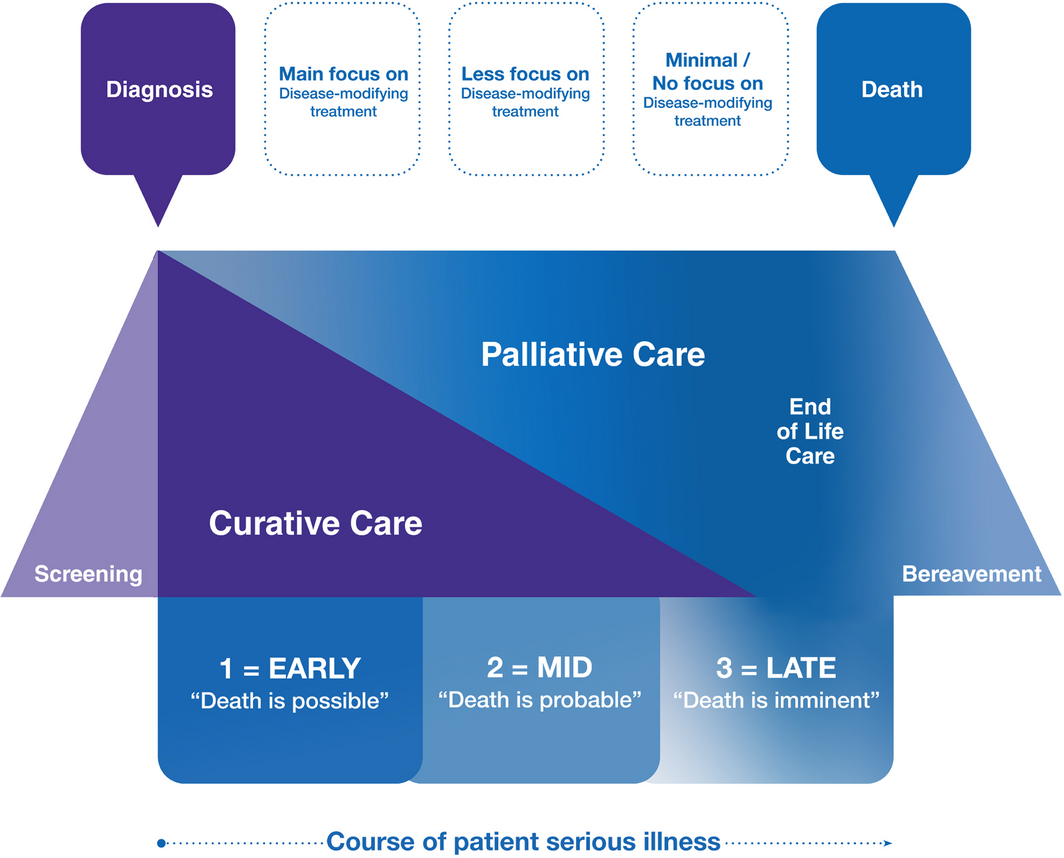List and Explain 3 Options When Considering End-of-life-care
End-of-life care EoLC refers to health care for a person nearing the end of their life or in the advanced stage of a terminal illness. Considering End-of-Life Care Four Considerations While Making Decisions about End-of-life Care.

End Of Life Care News Research And Analysis The Conversation Page 1
However physicians face many ethical challenges in end-of-life care.

. Here we are going to review Palliative End-of-Life Doula Caregivers Hospice and The Lovie Theory Care options. Routine activities including bathing feeding dressing and turning may require total. End of life care should help you to live as well as possible until you die and to die with dignity.
The loved ones go through many faces as does the individual that is going through the dying process. Nurses also need to reflect on their own belief systems about. The focus of this type of care is managing symptoms and providing comfort and assistance.
The goal of end-of-life care is to prevent or relieve suffering as much as possible while respecting the desires of dying patients. Communication in end of life care 31 Explain how an individuals ability to communicate may vary over time 32 Explain own role in responding to key questions and cues from individuals and others regarding their end of life experience 33 Describe how to respond to difficult questions from individuals and others in end of life care 34 Outline strategies to manage. This includes help with emotional and mental health spiritual and social needs.
Fentanyl NA 25 to 100 mcg Every 2 to 3 hours Hydromorphone Dilaudid 2 to 4 mg 05 to 2 mg Every. End of life. The nurse clarifies that this small dose of morphine is helpful in controlling the end-of-life symptom of.
A major source of expense for the Medicare program is beneficiaries at end of life. The goal is to improve. Since the decisions to be made may concern patients family members and society as well as the patients it is important to protect the rights dignity and vigor of all.
Considering the six steps of the end of life care pathway the paper will examine Mrs Jones situation. Since medical science has evolved over the time and now has a potentiality to reshape the circumstances during death and in turn prolong lives various ethical issues surround end-of-life care. It is a very wide area that covers many topics.
End-of-life care decision making carries paramount importance due to the advancements in medical sciences. The cost of this care can overwhelm the patient and their family at an already sensitive time making planning for these expenses essential. Resuscitation status.
For instance the Oregon law applies only to terminally ill patients with less than six months to live with a diagnosis confirmed by two physicians. The pathway begins with discussions regarding diagnosis and recognising a patient needing end of life care support. Estimates of the percentage of Medicare costs t.
As your loved one enters late-stage or end-of-life care their needs can change impacting the demands youll now face as their caregiver. 1 A lack of understanding and training whit regard to the principles of end of life care and services that are available. Practical care and assistance.
Hospice care is specialized care for people who are believed to have a life expectancy of 6 months or less. This leaflet deals with advanced care planning in the UK. This can include the following areas.
43 End-of-life issues facing patients family and caregivers include the following. Medication Oral dose Intravenous or subcutaneous dose Initial dosing frequency. There are so many considerations for both the patient and family to consider when selecting care options.
Managing mental and emotional needs. 2 Discuss some of the options for end-of-life care 3 Explain the importance of discussing options for end-of-life care BEFORE it is needed 4 Describe the. Hospice focuses their attention on helping that individual with psychosocial and medical fEND OF LIFE CARE 3 help.
Making a move to end-of-life care isnt an easy decision. This year 26 states and the District of Columbia are considering legislation on end-of-life options. The phrase end-of-life care can include a variety of options in regard to care settings and levels of care being received.
Each experience is different at the end of life. End of life and palliative care provides practical help with daily tasks as well. In particular it covers three subjects.
Medicare Cost at End of Life As the Medicare program struggles to control expenditures there is increased focus on opportunities to manage patient populations more efficiently and at a lower cost. Generally speaking people who are dying need care in four areasphysical comfort mental and emotional needs spiritual issues and practical tasks. Hospice care can be provided at a persons home or at a.
Then there is anger where an individual may ask why me. They should also support your family carers or other people who are important to you. Perhaps your loved one can no longer talk sit walk eat or make sense of the world.
These stages include denial where ones think this cannot be happening. Accepting hospice care means shifting from the use of medical treatments to prolong life as much as possible toward a focus on treating symptoms and improving quality of whatever life remains for a person. One dose is not enough for euthanasia.
So they can explain them to patients who ask about them. A Administering frequent small doses of morphine sulfate is standard protocol to reduce end-of-life air hunger. Who Should Make the.
By Michael Drew LNHA November 8 2019 Comments Off on Four Considerations While Making Decisions about End-of-life Care. End-of-life care involves a range of possible decisions including hospice care palliative care patients. Without advanced planning individuals can end up spending their finals days in settings they would not have chosen.
Lasting power of attorney LPA. Beveridge 2002 suggest that health professionals try to protect themselves from breaking bad news to patients. I need your help with something I need to think about the future.
End-of-Life Care in Yardley PA. End of life care is a term used to cover the issues you need to think about and plan for when you are approaching death. Providing support for practical tasks.
4 Late referrals 18 b Suggest ways to minimize the barriers you have identified above. The purpose of this narrative review is to discuss issues such. Here are some ways the Conversation Project suggests starting a talk about end-of-life care.
2 Negative attitudes towards end of life care 3 A lack of understanding regarding cultural and spiritual issues in relation to the dying and the dead. Spiritual needs at the end of life. End of life and palliative care aims to help you if you have a life-limiting or life-threatening illness.
Death can come suddenly or a person may linger in a near-death state for days weeks or even months. End-of-life issues are often complex moral ethical or legal dilemmas or a combination of these regarding a patients vital physiologic functions medical-surgical prognosis quality of life and personal values and beliefs. The people providing your care should ask you about your wishes and preferences and take these into account as they work with you to plan your care.
Will you help me I was thinking about what happened to __________ and it made me realize Even though Im OK right now Im worried that ________ and I want to be prepared.

End Of Life Care The Hastings Center

Reframing Palliative Care To Improve The Quality Of Life Of People Diagnosed With A Serious Illness The Medical Journal Of Australia

Infographic The Importance Of Talking About End Of Life Care Hospital Social Work Medical Social Work Life Care
Comments
Post a Comment